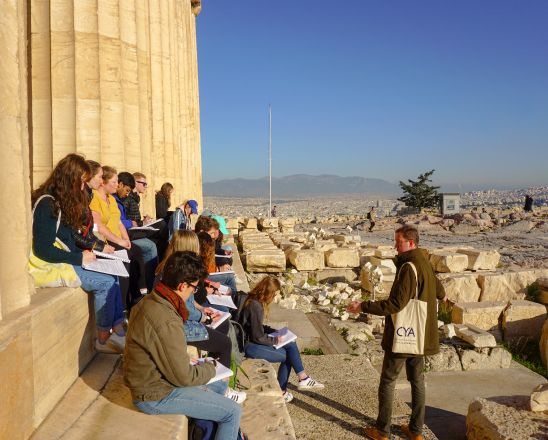
The Topography and Monuments of Athens
Please note: “The Topography and Monuments of Athens” course is a detailed archaeology course intended for students with some background in archaeology and/or ancient history..
Classical Athens grew triumphantly from the ashes of the Persian Wars, set up one of the earliest and most direct democracies, held firmly onto an Empire of hundreds of subordinate states, and amid the bustle of exuberant religious and theatrical festivals, polemical law suits, the crowning achievements of its poets, historians and philosophers, it created some of the greatest monuments known from Antiquity.
This exclusively site-based course gives a comprehensive overview of the topography, archaeology and history of Athens, focusing particularly on the great monuments of the Classical and Roman city. Every major site – and many minor ones – will be explored, paying attention to their physical setting, architectural and archaeological characteristics, and position in the political, religious and social lives of the Athenians.
Thucydides, the gifted historian of the Peloponnesian War, put into the mouth of Pericles the words, ‘Future ages will wonder at us, as the present age wonders at us now.’ Future ages did indeed wonder at the buildings of the ancient city, and this course will trace the rediscovery of Athens’ antiquities from the earliest modern travelers to Greece in the 15th century, through to the development of scientific archaeology in the 19th, and indeed will look the role of archaeology in Athens from the foundation of the Modern Greek state up to the present day.
Students will gain a wide range of key skills during the course: topographic interpretation from maps and site plans with an understanding of how landscape affects site development; research skills from assessing publications from excavation reports to antiquarian rare books and archival or photographic collections; oral presentation skills through preparing individual reports presented on site to the group; as well as gaining an ability to use the evidence of archaeology, architecture, inscriptions, and coins in the construction of historical arguments
Cannot be taken with A331.
(Former course title: The Sites & Monuments of Athens)
CYA professor Pitt describes how “In Greece, Knowledge Comes Alive…” on our blog



